CYC Integrative Seminar 11: Mentorship, Supervision, and Development
VerifiedAdded on 2022/08/14
|7
|1467
|17
Homework Assignment
AI Summary
This assignment delves into the critical aspects of mentorship, supervision, and self-care within the context of a Child and Youth Care (CYC) Integrative Seminar 11. It explores the process of finding a suitable mentor, outlining the desired characteristics and essential interview questions to assess their suitability. The assignment emphasizes the importance of self-monitoring in professional development, including skill acquisition, goal setting, and addressing potential challenges. Furthermore, it examines the significance of supervision, highlighting the need for a healthy supervisor-supervisee relationship and strategies for effectively navigating this dynamic. The document also addresses the crucial topic of self-care, discussing compassion fatigue and burnout, and providing methods for prevention and management. The student has provided a comprehensive analysis of these core elements to foster growth and well-being in the CYC field.

Running head: CYC INTEGRATIVE SEMINAR 11
1
CYC integrative seminar 11
Name
Professor
Course
Date
1
CYC integrative seminar 11
Name
Professor
Course
Date
Paraphrase This Document
Need a fresh take? Get an instant paraphrase of this document with our AI Paraphraser
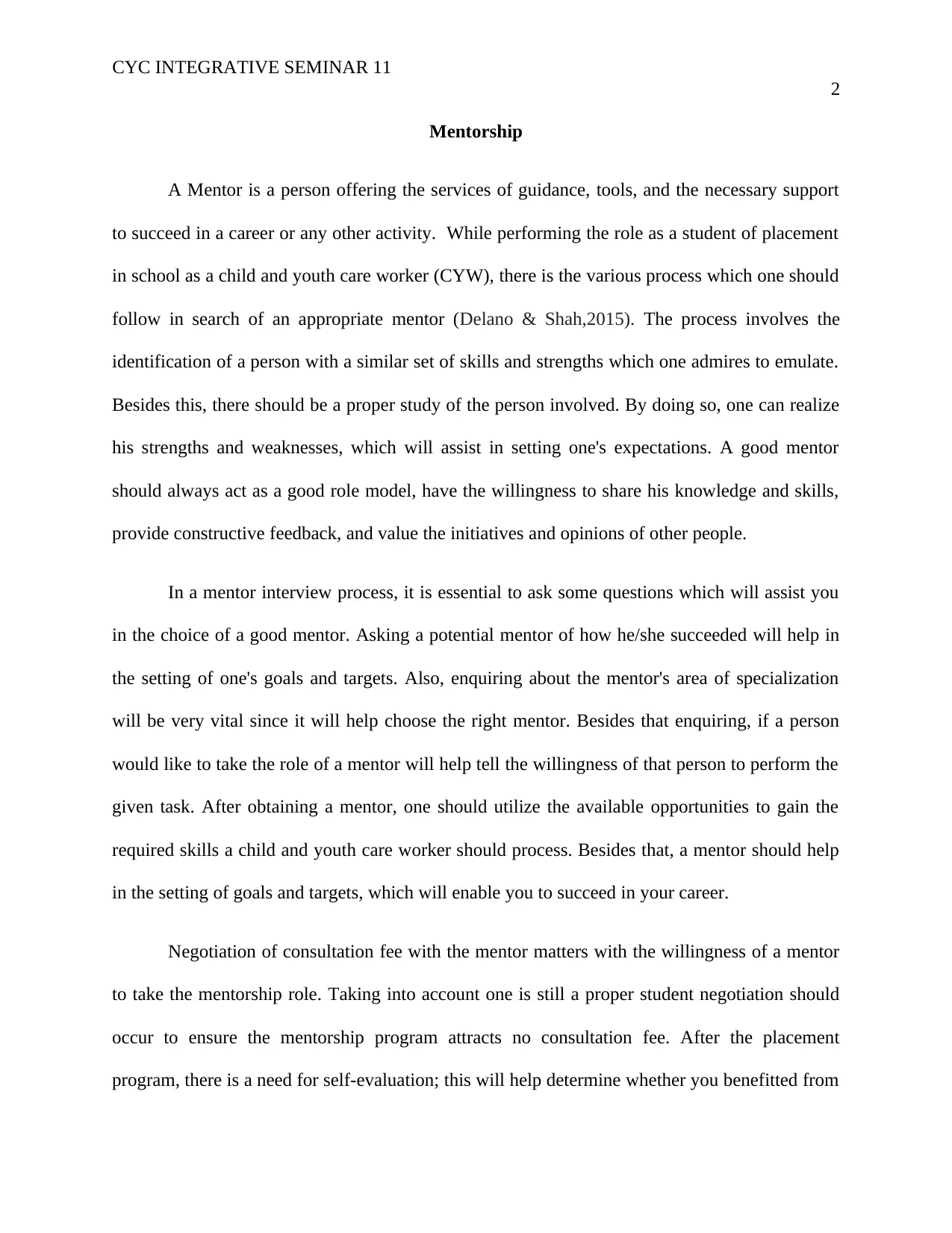
CYC INTEGRATIVE SEMINAR 11
2
Mentorship
A Mentor is a person offering the services of guidance, tools, and the necessary support
to succeed in a career or any other activity. While performing the role as a student of placement
in school as a child and youth care worker (CYW), there is the various process which one should
follow in search of an appropriate mentor (Delano & Shah,2015). The process involves the
identification of a person with a similar set of skills and strengths which one admires to emulate.
Besides this, there should be a proper study of the person involved. By doing so, one can realize
his strengths and weaknesses, which will assist in setting one's expectations. A good mentor
should always act as a good role model, have the willingness to share his knowledge and skills,
provide constructive feedback, and value the initiatives and opinions of other people.
In a mentor interview process, it is essential to ask some questions which will assist you
in the choice of a good mentor. Asking a potential mentor of how he/she succeeded will help in
the setting of one's goals and targets. Also, enquiring about the mentor's area of specialization
will be very vital since it will help choose the right mentor. Besides that enquiring, if a person
would like to take the role of a mentor will help tell the willingness of that person to perform the
given task. After obtaining a mentor, one should utilize the available opportunities to gain the
required skills a child and youth care worker should process. Besides that, a mentor should help
in the setting of goals and targets, which will enable you to succeed in your career.
Negotiation of consultation fee with the mentor matters with the willingness of a mentor
to take the mentorship role. Taking into account one is still a proper student negotiation should
occur to ensure the mentorship program attracts no consultation fee. After the placement
program, there is a need for self-evaluation; this will help determine whether you benefitted from
2
Mentorship
A Mentor is a person offering the services of guidance, tools, and the necessary support
to succeed in a career or any other activity. While performing the role as a student of placement
in school as a child and youth care worker (CYW), there is the various process which one should
follow in search of an appropriate mentor (Delano & Shah,2015). The process involves the
identification of a person with a similar set of skills and strengths which one admires to emulate.
Besides this, there should be a proper study of the person involved. By doing so, one can realize
his strengths and weaknesses, which will assist in setting one's expectations. A good mentor
should always act as a good role model, have the willingness to share his knowledge and skills,
provide constructive feedback, and value the initiatives and opinions of other people.
In a mentor interview process, it is essential to ask some questions which will assist you
in the choice of a good mentor. Asking a potential mentor of how he/she succeeded will help in
the setting of one's goals and targets. Also, enquiring about the mentor's area of specialization
will be very vital since it will help choose the right mentor. Besides that enquiring, if a person
would like to take the role of a mentor will help tell the willingness of that person to perform the
given task. After obtaining a mentor, one should utilize the available opportunities to gain the
required skills a child and youth care worker should process. Besides that, a mentor should help
in the setting of goals and targets, which will enable you to succeed in your career.
Negotiation of consultation fee with the mentor matters with the willingness of a mentor
to take the mentorship role. Taking into account one is still a proper student negotiation should
occur to ensure the mentorship program attracts no consultation fee. After the placement
program, there is a need for self-evaluation; this will help determine whether you benefitted from
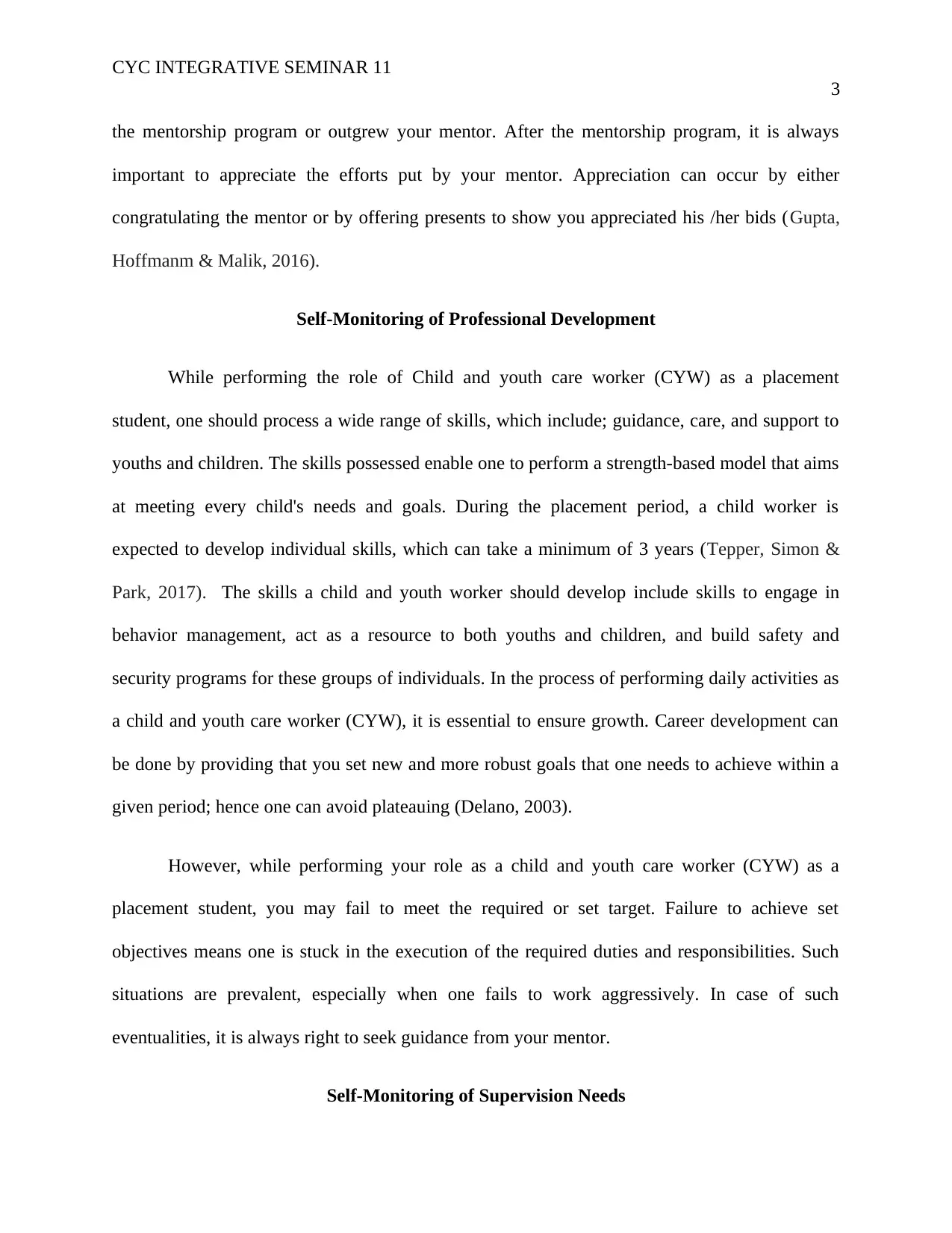
CYC INTEGRATIVE SEMINAR 11
3
the mentorship program or outgrew your mentor. After the mentorship program, it is always
important to appreciate the efforts put by your mentor. Appreciation can occur by either
congratulating the mentor or by offering presents to show you appreciated his /her bids (Gupta,
Hoffmanm & Malik, 2016).
Self-Monitoring of Professional Development
While performing the role of Child and youth care worker (CYW) as a placement
student, one should process a wide range of skills, which include; guidance, care, and support to
youths and children. The skills possessed enable one to perform a strength-based model that aims
at meeting every child's needs and goals. During the placement period, a child worker is
expected to develop individual skills, which can take a minimum of 3 years (Tepper, Simon &
Park, 2017). The skills a child and youth worker should develop include skills to engage in
behavior management, act as a resource to both youths and children, and build safety and
security programs for these groups of individuals. In the process of performing daily activities as
a child and youth care worker (CYW), it is essential to ensure growth. Career development can
be done by providing that you set new and more robust goals that one needs to achieve within a
given period; hence one can avoid plateauing (Delano, 2003).
However, while performing your role as a child and youth care worker (CYW) as a
placement student, you may fail to meet the required or set target. Failure to achieve set
objectives means one is stuck in the execution of the required duties and responsibilities. Such
situations are prevalent, especially when one fails to work aggressively. In case of such
eventualities, it is always right to seek guidance from your mentor.
Self-Monitoring of Supervision Needs
3
the mentorship program or outgrew your mentor. After the mentorship program, it is always
important to appreciate the efforts put by your mentor. Appreciation can occur by either
congratulating the mentor or by offering presents to show you appreciated his /her bids (Gupta,
Hoffmanm & Malik, 2016).
Self-Monitoring of Professional Development
While performing the role of Child and youth care worker (CYW) as a placement
student, one should process a wide range of skills, which include; guidance, care, and support to
youths and children. The skills possessed enable one to perform a strength-based model that aims
at meeting every child's needs and goals. During the placement period, a child worker is
expected to develop individual skills, which can take a minimum of 3 years (Tepper, Simon &
Park, 2017). The skills a child and youth worker should develop include skills to engage in
behavior management, act as a resource to both youths and children, and build safety and
security programs for these groups of individuals. In the process of performing daily activities as
a child and youth care worker (CYW), it is essential to ensure growth. Career development can
be done by providing that you set new and more robust goals that one needs to achieve within a
given period; hence one can avoid plateauing (Delano, 2003).
However, while performing your role as a child and youth care worker (CYW) as a
placement student, you may fail to meet the required or set target. Failure to achieve set
objectives means one is stuck in the execution of the required duties and responsibilities. Such
situations are prevalent, especially when one fails to work aggressively. In case of such
eventualities, it is always right to seek guidance from your mentor.
Self-Monitoring of Supervision Needs
⊘ This is a preview!⊘
Do you want full access?
Subscribe today to unlock all pages.

Trusted by 1+ million students worldwide
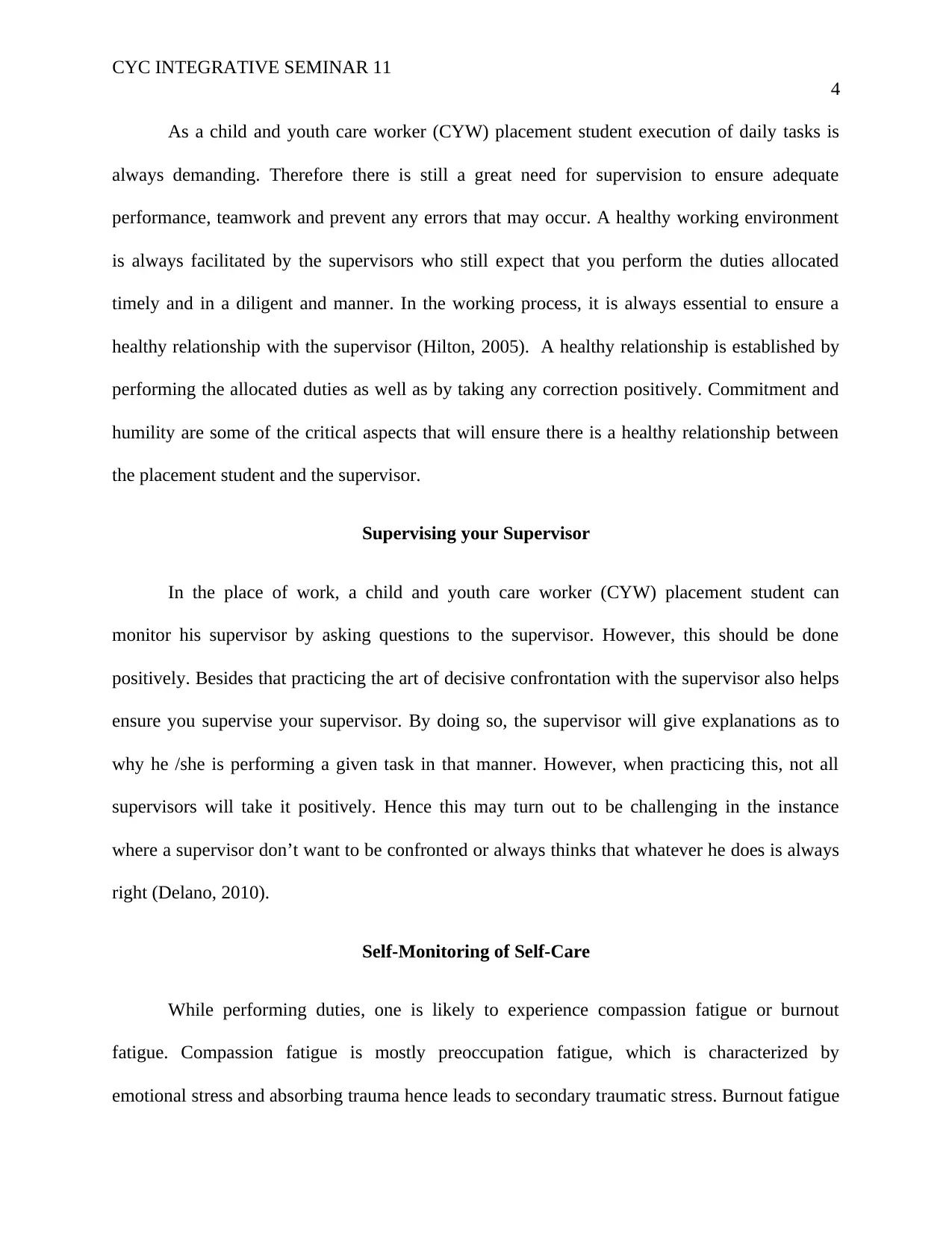
CYC INTEGRATIVE SEMINAR 11
4
As a child and youth care worker (CYW) placement student execution of daily tasks is
always demanding. Therefore there is still a great need for supervision to ensure adequate
performance, teamwork and prevent any errors that may occur. A healthy working environment
is always facilitated by the supervisors who still expect that you perform the duties allocated
timely and in a diligent and manner. In the working process, it is always essential to ensure a
healthy relationship with the supervisor (Hilton, 2005). A healthy relationship is established by
performing the allocated duties as well as by taking any correction positively. Commitment and
humility are some of the critical aspects that will ensure there is a healthy relationship between
the placement student and the supervisor.
Supervising your Supervisor
In the place of work, a child and youth care worker (CYW) placement student can
monitor his supervisor by asking questions to the supervisor. However, this should be done
positively. Besides that practicing the art of decisive confrontation with the supervisor also helps
ensure you supervise your supervisor. By doing so, the supervisor will give explanations as to
why he /she is performing a given task in that manner. However, when practicing this, not all
supervisors will take it positively. Hence this may turn out to be challenging in the instance
where a supervisor don’t want to be confronted or always thinks that whatever he does is always
right (Delano, 2010).
Self-Monitoring of Self-Care
While performing duties, one is likely to experience compassion fatigue or burnout
fatigue. Compassion fatigue is mostly preoccupation fatigue, which is characterized by
emotional stress and absorbing trauma hence leads to secondary traumatic stress. Burnout fatigue
4
As a child and youth care worker (CYW) placement student execution of daily tasks is
always demanding. Therefore there is still a great need for supervision to ensure adequate
performance, teamwork and prevent any errors that may occur. A healthy working environment
is always facilitated by the supervisors who still expect that you perform the duties allocated
timely and in a diligent and manner. In the working process, it is always essential to ensure a
healthy relationship with the supervisor (Hilton, 2005). A healthy relationship is established by
performing the allocated duties as well as by taking any correction positively. Commitment and
humility are some of the critical aspects that will ensure there is a healthy relationship between
the placement student and the supervisor.
Supervising your Supervisor
In the place of work, a child and youth care worker (CYW) placement student can
monitor his supervisor by asking questions to the supervisor. However, this should be done
positively. Besides that practicing the art of decisive confrontation with the supervisor also helps
ensure you supervise your supervisor. By doing so, the supervisor will give explanations as to
why he /she is performing a given task in that manner. However, when practicing this, not all
supervisors will take it positively. Hence this may turn out to be challenging in the instance
where a supervisor don’t want to be confronted or always thinks that whatever he does is always
right (Delano, 2010).
Self-Monitoring of Self-Care
While performing duties, one is likely to experience compassion fatigue or burnout
fatigue. Compassion fatigue is mostly preoccupation fatigue, which is characterized by
emotional stress and absorbing trauma hence leads to secondary traumatic stress. Burnout fatigue
Paraphrase This Document
Need a fresh take? Get an instant paraphrase of this document with our AI Paraphraser
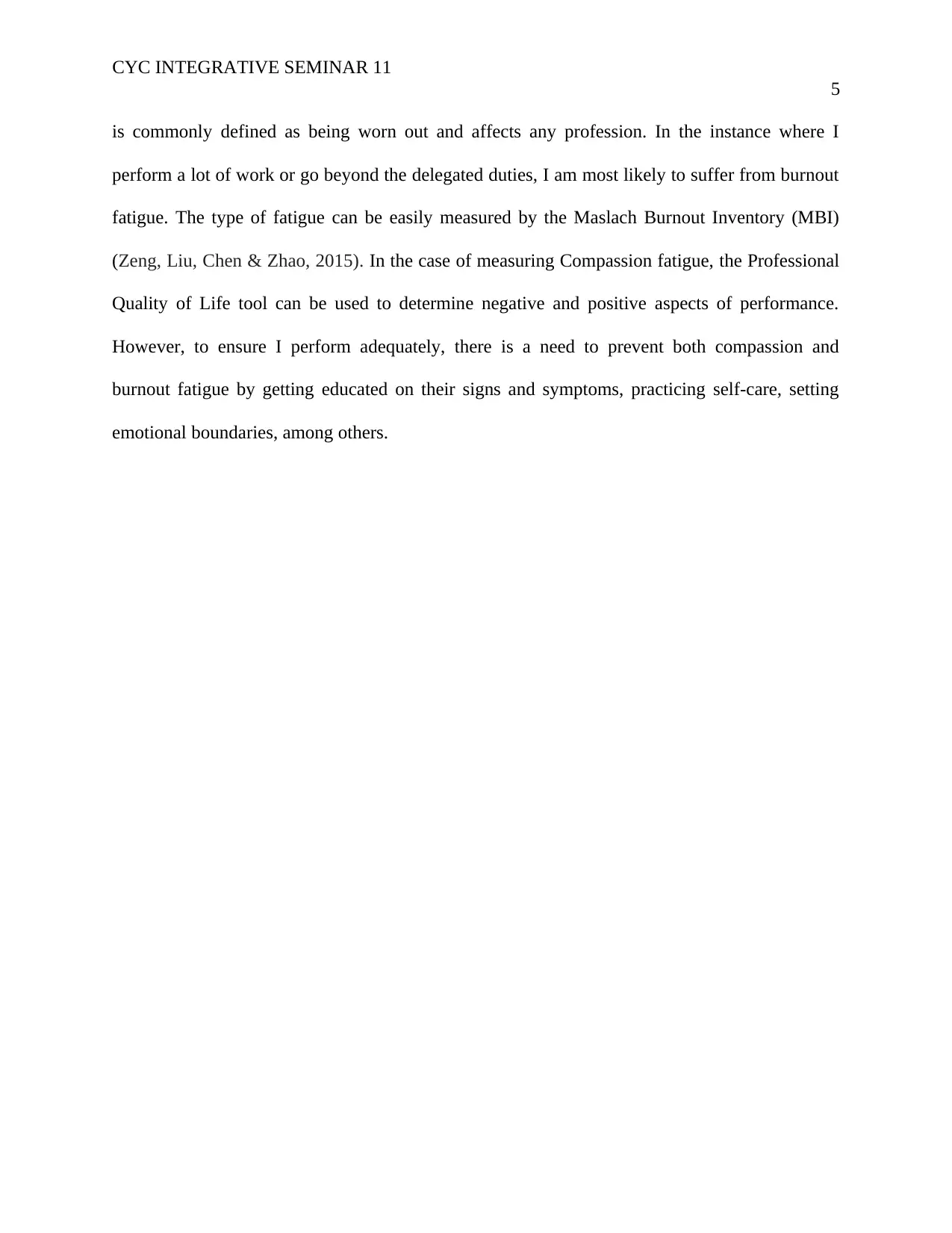
CYC INTEGRATIVE SEMINAR 11
5
is commonly defined as being worn out and affects any profession. In the instance where I
perform a lot of work or go beyond the delegated duties, I am most likely to suffer from burnout
fatigue. The type of fatigue can be easily measured by the Maslach Burnout Inventory (MBI)
(Zeng, Liu, Chen & Zhao, 2015). In the case of measuring Compassion fatigue, the Professional
Quality of Life tool can be used to determine negative and positive aspects of performance.
However, to ensure I perform adequately, there is a need to prevent both compassion and
burnout fatigue by getting educated on their signs and symptoms, practicing self-care, setting
emotional boundaries, among others.
5
is commonly defined as being worn out and affects any profession. In the instance where I
perform a lot of work or go beyond the delegated duties, I am most likely to suffer from burnout
fatigue. The type of fatigue can be easily measured by the Maslach Burnout Inventory (MBI)
(Zeng, Liu, Chen & Zhao, 2015). In the case of measuring Compassion fatigue, the Professional
Quality of Life tool can be used to determine negative and positive aspects of performance.
However, to ensure I perform adequately, there is a need to prevent both compassion and
burnout fatigue by getting educated on their signs and symptoms, practicing self-care, setting
emotional boundaries, among others.
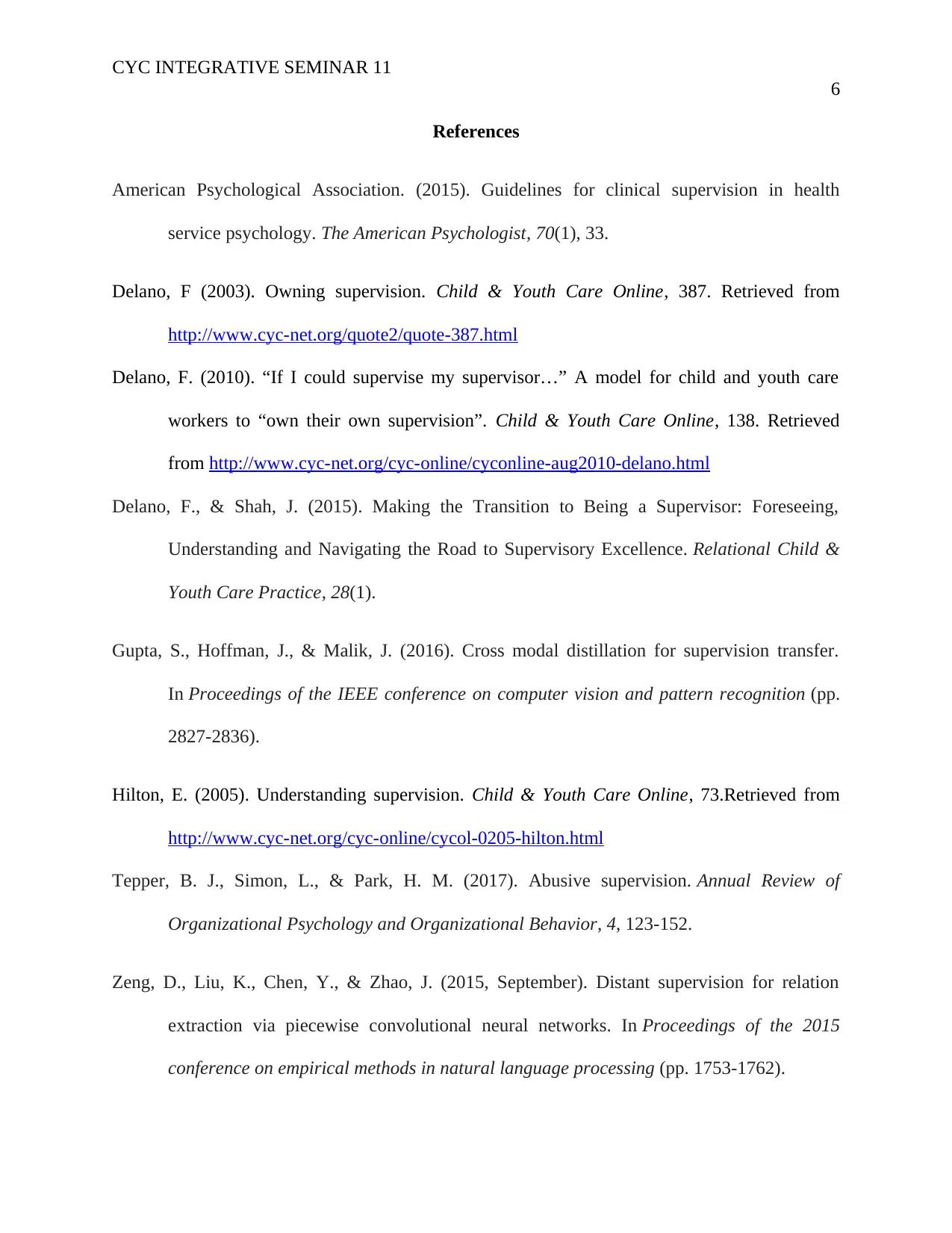
CYC INTEGRATIVE SEMINAR 11
6
References
American Psychological Association. (2015). Guidelines for clinical supervision in health
service psychology. The American Psychologist, 70(1), 33.
Delano, F (2003). Owning supervision. Child & Youth Care Online, 387. Retrieved from
http://www.cyc-net.org/quote2/quote-387.html
Delano, F. (2010). “If I could supervise my supervisor…” A model for child and youth care
workers to “own their own supervision”. Child & Youth Care Online, 138. Retrieved
from http://www.cyc-net.org/cyc-online/cyconline-aug2010-delano.html
Delano, F., & Shah, J. (2015). Making the Transition to Being a Supervisor: Foreseeing,
Understanding and Navigating the Road to Supervisory Excellence. Relational Child &
Youth Care Practice, 28(1).
Gupta, S., Hoffman, J., & Malik, J. (2016). Cross modal distillation for supervision transfer.
In Proceedings of the IEEE conference on computer vision and pattern recognition (pp.
2827-2836).
Hilton, E. (2005). Understanding supervision. Child & Youth Care Online, 73.Retrieved from
http://www.cyc-net.org/cyc-online/cycol-0205-hilton.html
Tepper, B. J., Simon, L., & Park, H. M. (2017). Abusive supervision. Annual Review of
Organizational Psychology and Organizational Behavior, 4, 123-152.
Zeng, D., Liu, K., Chen, Y., & Zhao, J. (2015, September). Distant supervision for relation
extraction via piecewise convolutional neural networks. In Proceedings of the 2015
conference on empirical methods in natural language processing (pp. 1753-1762).
6
References
American Psychological Association. (2015). Guidelines for clinical supervision in health
service psychology. The American Psychologist, 70(1), 33.
Delano, F (2003). Owning supervision. Child & Youth Care Online, 387. Retrieved from
http://www.cyc-net.org/quote2/quote-387.html
Delano, F. (2010). “If I could supervise my supervisor…” A model for child and youth care
workers to “own their own supervision”. Child & Youth Care Online, 138. Retrieved
from http://www.cyc-net.org/cyc-online/cyconline-aug2010-delano.html
Delano, F., & Shah, J. (2015). Making the Transition to Being a Supervisor: Foreseeing,
Understanding and Navigating the Road to Supervisory Excellence. Relational Child &
Youth Care Practice, 28(1).
Gupta, S., Hoffman, J., & Malik, J. (2016). Cross modal distillation for supervision transfer.
In Proceedings of the IEEE conference on computer vision and pattern recognition (pp.
2827-2836).
Hilton, E. (2005). Understanding supervision. Child & Youth Care Online, 73.Retrieved from
http://www.cyc-net.org/cyc-online/cycol-0205-hilton.html
Tepper, B. J., Simon, L., & Park, H. M. (2017). Abusive supervision. Annual Review of
Organizational Psychology and Organizational Behavior, 4, 123-152.
Zeng, D., Liu, K., Chen, Y., & Zhao, J. (2015, September). Distant supervision for relation
extraction via piecewise convolutional neural networks. In Proceedings of the 2015
conference on empirical methods in natural language processing (pp. 1753-1762).
⊘ This is a preview!⊘
Do you want full access?
Subscribe today to unlock all pages.

Trusted by 1+ million students worldwide

CYC INTEGRATIVE SEMINAR 11
7
7
1 out of 7
Your All-in-One AI-Powered Toolkit for Academic Success.
+13062052269
info@desklib.com
Available 24*7 on WhatsApp / Email
![[object Object]](/_next/static/media/star-bottom.7253800d.svg)
Unlock your academic potential
Copyright © 2020–2026 A2Z Services. All Rights Reserved. Developed and managed by ZUCOL.

